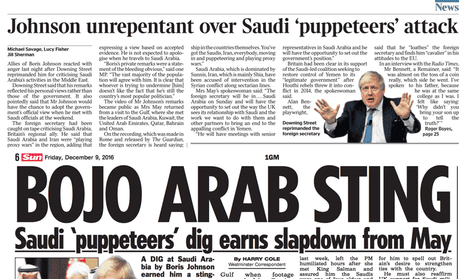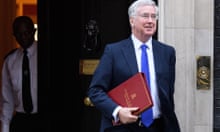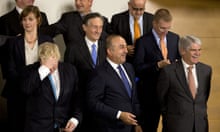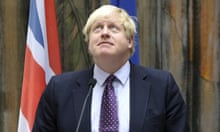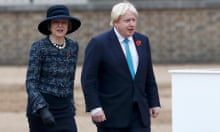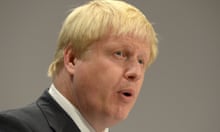News editors at BBC TV and ITV thought the Guardian’s revelation on Thursday of Boris Johnson’s statement about Saudi Arabia fighting a proxy war merited big coverage on their bulletins.
Similarly, radio news editors on major talk stations gave the story top billing throughout the day, and into the evening, following the prime minister’s unprecedented slapping down of her foreign secretary.
But Friday morning’s newspaper response was not nearly as comprehensive. Several chose to play down Theresa May’s public defenestration of Johnson.
Note, for example, the fact that the Times’s report was on page 13. And the Sun’s seven-paragraph piece was on page 6. Neither paper thought it worthy of a leading article.
I couldn’t find it at all in the Daily Express. Although the Daily Mail did give it most of page 4 (“It’s war: Boris and Theresa trade blows...”) the paper kept its own counsel on whether it backed Johnson or May.
By contrast, the Daily Telegraph splashed it on page 1, “Saudi row widens Boris rift with May” and carried an editorial pleading the case of its former (and soon-to-be future?) columnist.
The Guardian produced a follow-up page 1 article in which it reported that Johnson’s allies had spoken up on his behalf. The Daily Mirror, which might have been expected to make much of an internal cabinet dispute, virtually buried the story in a sidebar on a spread about terrorist threats.
What was happening here? How could the news values of national paper editors be so different? A public row between a prime minister and foreign secretary is hardly a common event.
I accept that the story was running all day and that some editors believe it necessary to present supposedly new material for their audiences.
Even so, if a similar row had occurred between Jeremy Corbyn and Johnson’s shadow, Emily Thornberry, I imagine it would have been front page news and that leader writers would have had a field day.
So why the silence on the Johnson-May split? In the case of the Times, Sun, Express and Mail, it’s hard not to conclude that their reasoning had more to do with a pro-Brexit agenda.
Although they agreed whole-heartedly with Johnson, they refuse to attack May because they don’t want to do anything likely to destabilise her in this sensitive Brexit period.
On the other hand, they couldn’t afford to attack Johnson because they are aware of their readers’ approval for his attack on Saudi Arabia.
Note the irony. These papers were echoing the scenario at the heart of the story they were underplaying. By displaying the diplomatic discretion of foreign office mandarins they were seeking to divert their readers’ attention from the implications of a major government rift.
The Telegraph, although as eager as other Brexit-supporting papers to see May disengage from the European Union, acted differently because it has cast itself as Boris Johnson’s propaganda machine.
Its leading article was carefully calibrated. It thought Johnson “unwise to speak bluntly of Saudi Arabia” but also thought May “unwise... to respond in such a harsh way to her colleague’s words.”
But its sympathies were clear. Voters “like and trust” Johnson because he “brings authenticity to the government.” As such, “he is a key player, critical to its popularity and success.” And then came the Brexit point:
“He was also indispensable to the leave campaign, which means that he represents millions of voters on the most salient issue of our time.”
Like the Guardian, it picked up on the support for Johnson within his party and argued that May should “have shrugged and said ‘Boris is Boris’ - just as David Cameron used to do.”
Unlike the Guardian, it did not dare to touch on the gross hypocrisy of Johnson’s supposed plain-speaking, which has “led to a popular misconception that he is a straight shooter.”
The key paragraphs in its editorial stated:
“Mr Johnson’s justified distaste for Saudi conduct in proxy wars would be best expressed by halting arms exports to the country; Britain has licensed more than £3.3bn of weapons sales since the Yemen conflict began.
But this was never about a principled policy change. After his accusation of ‘puppeteering’ he reverted to the usual defence of Riyadh on the Andrew Marr show, and when he visits Saudi ministers this weekend his comments will presumably be in the latter vein.”
Why, you might well ask, did the anti-Tory Daily Mirror not say the same? I really don’t know. It was a bad oversight.
